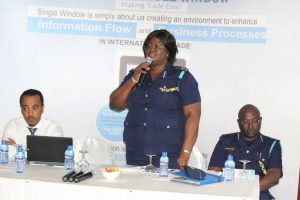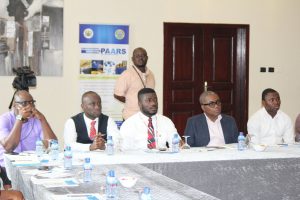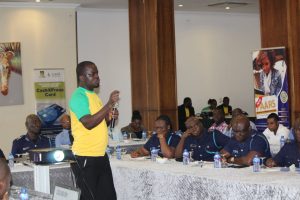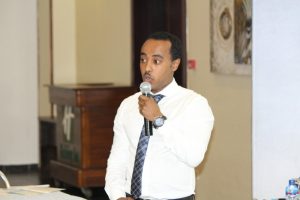
Accra, June 23, 2017//- West Blue Consulting, the technical partners of the Ghana National Single Window (GNSW) project has taken giant steps to accelerate cross border trade among Ghana and its trading partners.
To this end, the company is ready to roll out an eManifest platform next month, as part of the implementation of the GNSW project to enable customs officials of the Ghana Revenue Authority (GRA) to access advance information on all cargo arriving in the country by air in real time.
This is a departure from the existing practice in which customs officials have to shuttle from one airline operator to the other in search of such information.
eManifest, according to officials of West Blue would modernise and improve cross-border commercial processes. When fully implemented, eManifest will require carriers and freight forwarders to send advance commercial information about their shipments electronically to the GRA.
The collection and risk assessment of pre-arrival data will improve the GRA’s ability to detect high-risk shipments before they arrive at the border. At the same time, low-risk, legitimate trade will be able to cross the border more efficiently.
eManifest makes Ghana’s border processes more secure and compatible with international standards, which is important for the business community and for the country as a whole, senior customs officials said in Accra.
Hundreds of commercial shipments reach Ghana’s borders each day. By rigorously performing risk assessments on the advance data sent by the party who is in the best position to provide it, the GRA is better able to assess the level of risk associated with each shipment.
Speaking at the International Air Transport Association (IATA) Advance Cargo Information (ACI) workshop in Accra, the Kotoka International Airport (KIA) Sector Commander of the Customs Division of the GRA, Madam Theresa Kyei Asare added: “The e-Manifest system will simplify the process and make the clearing system faster. For example, if you are supposed to deliver the goods within 48 hours, with the electronic manifest we will be able to deliver within 24 hours or even at a shorter time’’.
She was quick to stress that the eManifest would also allow a seamless dissemination of information on all cargo due in the country by air to all relevant stakeholders in real time. The Manifest is the first and foremost document that customs officials require in order to process cargo clearance, Madam Asare added.
“This is very welcome because it will make our work very simple, efficient and curtail the stress of moving from one airline operator to the other for the manifest manually to commence clearing processes”.
“But with the eManifest we are talking about five minutes at most and you have all the information you need to speed up the process. This is a win-win for us because it brings respite to us and the importers or shippers as well’’, Madam Asare told the participants at the workshop.
In an interview, the Manager in charge of training at West Blue Consulting, Mr Ransford Mensah emphasised that the platform was aimed at deploying technology in the entire scope of operations at the airport including boarding through to landing as well as the manifest section itself to ensure effective trade facilitation through automation with the associated benefit of reducing the cost and time of doing business in the country.
The platform, according to Mr Mensah allows authorised customs officials to log in and transact business without hindrance, stressing that the platform has been programmed to operate from end-to- end.

Reacting to concerns by some stakeholders at the workshop for room to be made for additional manifest to address the situation in which a cargo arrived at the airport but has not been captured in the manifest, Mr. Mensah assured them that company was going to consider all their concerns raised and factor them into the platform.
Another concern which was raised by the airliners was network or system failure, but the Deputy Head of IT at West Blue Consulting, Mr Gilbert Frimpong, assured that the company and its partners would provide 24/7 ubiquitous internet service for the platform.

Taking the participants through an overview of IATA on Advance Cargo Information (ACI) at the workshop which aimed among other things at enhancing the skills of air cargo professionals, the Regional Manager for Africa in charge of Airport, Cargo, Passenger and Security at IATA, Mr Getnet Tilahun Taye, enumerated the benefits that the country would drive in the implementation of the ACI.
These he mentioned include: “Customs are able to match resources to risks; low risk consignments are less likely to be inspected; customs increase clearance time significantly moving from days to hours; more predictability of goods; reduce cost getting goods to the markets; and detection of illegal goods increase initially resulting in increased long term compliance”.

Recently, the Chief Executive Officer of West Blue Consulting, Madam Valentina Mintah revealed that 25 airlines electronically submit their manifests to the Pre-Arrival Assessment Reporting System (PAARS) up to four hours before landing at the KIA.
Previously, they were submitted in hard copies to ground handlers, after the arrival of the airlines at the airport.
The PAARS is a modernized system that has been developed by the Customs Division of GRA as part of the implementation of the GNSW project to enhance revenue mobilization, improve border security and customs clearance, overcome duplication across regulatory agencies and promote trade facilitation.
Madam Mintah explained to Members of the Parliamentary Select Committee on Trade, Industry and Tourism during a working visit to the company that; “customs and other agencies can get access to data in a timely manner to complete clearance processes even before the ship or plane arrives”.
This she would reduce the time and cost of doing business and aiding risk management and effective revenue collection for the country.
Since the introduction of the GNSW’s PAARS last year, traders are able to access Customs Classification and Valuation Report (CCVR) within 48 hours, she revealed.
In some cases, within an hour that is substantial improvement from the previous situation whereby it used to take traders more than a week or two weeks just to get their CCVR.
Madam Mintah was quick to add the system has brought some efficiency at the ports, reduced time, reduced corruption, and cost of doing business.
Another significant achievement Madam Mintah mentioned was the country’s historic performance on the recent World Bank’s Ease of Doing rankings.
Ghana had moved an impressive 13 places up on the Trading Across Borders in the latest World Bank Ease of Doing Business Report. The report accredited the performance to the GNSW project initiated by the government.
The Doing Business 2017 report, titled ‘Equal Opportunity for All’, showed that Ghana was placed at position 108 out of 190 countries surveyed in the Overall Ranking of Ease of Doing Business – an improvement from 111 in the previous report.
In the sub-Saharan Africa sub-region, Ghana ranked in the Top 10, coming 9th, out of the 47 countries ranked in the region. This is evidence that the Government of Ghana is pursuing active reforms to ensure the Ease of Doing Business in Ghana.
The Customs Division of GRA took over the processing of the CCRV from the destination companies in September 2015.
The CCRV replaced the destination inspection report also known as the Final Classification and Valuation Report (FCVR). In spite of the successes chalked so far through the implementation of the PAARS, West Blue is still working hard to facilitate trade and maximise revenue for the government.
Based on the experience of the Single Window implementations in other countries, West Blue estimated that the GNSW project would reduce the cost and time of international trade (import, export and transit) in Ghana by 50 per cent and 25 per cent respectively over the next five years.
Instructively, the GNSW project was initiated on 1st September 2015 by the Government of Ghana to enhance the country’s trade and economic development and secure and increase government revenue. It was officially launched in 1st December, 2015.
Indeed, the Single Window concept was developed by the United Nations Economic Commission for Europe (UNECE) in 2005 as an effort to simplify, harmonise and standardise international trade procedures and associated information flows between trade and government and within government itself.
UNECE, through its UN Centre for Trade Facilitation and Electronic Business (UN/CEFACT), defined Single Window as “a facility that allows parties involved in trade and transport to lodge standardised information and documents with a single entry point to fulfill all import, export, and transit-related regulatory requirements. If information is electronic, then individual data elements should only be submitted once”.
By Masahudu Ankiilu Kunateh, African Eye Report



